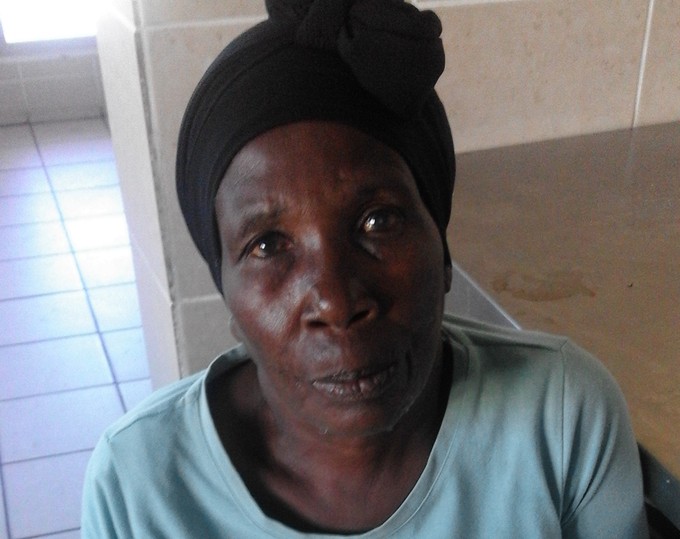
Nonqaba Runeyi lost her home in the fire in Masiphumelele in November 2015. Photo by Thembela Ntongana.
28 January 2016
It has been two months since a fire destroyed over a thousand shacks in Masiphumelele, and left approximately 4,000 people homeless.
Many have rebuilt their homes but about 250 people are still living in the township’s community hall. Many others are staying with friends and family hoping that they will have their own home again soon.
Nonqaba Runeyi is 73 years old. She stayed in a one room shack with her three year old granddaughter before the fire. She says staying at the community hall caused her to end up in hospital.
She says she was told her name does not appear on the list of people who are beneficiaries of the City’s building starter kit. This kit allows people to rebuild their shacks.
“I registered so many times but on the day that people were getting building material they told me that my name is not on the list. When I asked them I was told to step aside,” she says.
“For a few days my granddaughter and I slept under a tree in the bush because the community hall was closed and we do not have relatives around here. I did not want to bother other people.”
Yet Runeyi says sleeping on a mattress on a the cold floor in the community hall is better than going back home to the Eastern Cape where everything is far.
She says she was taken to the hospital because the left side of her body stopped working.
“I could not move my arm, and I was in a lot of pain. I was then rushed to the hospital where I was told that it’s a stroke. I had to leave my granddaughter with the people here because I had no other option.
“When I came back some of the men that stay at the hall gave me another mattress so I could have two but I still felt the cold because they are thin,” says Runeyi. “It is so cold,” she emphasises.
She recalls a day when they were woken up in the morning because it was grant day and people wanted to use the hall. The fire victims had to sit outside waiting till everyone was finished and that took the whole day.
Another resident Andiswa Fani says she has had to be separated from her children because she is scared that they might get sick living at the hall.
“I had to take them to my mom because there are too many people living here. We all have different sicknesses. We are breathing on top of each other. There are 250 people in this hall and there are children here.
“In the morning we all have to rush because there are three toilets for females and three for males. You want to be one of the first people or you going to be late. We use sinks and there is no privacy. Because you can’t go one at a time we must share,” says Fani.
The City of Cape Town’s Mayoral Committee Member for Human Settlements, Councillor Benedicta van Minnen, said residents seeking refuge in the hall are receiving humanitarian relief, including food. They also have access to water and sanitation and other services.
However some people staying in the hall said that the food, provided by the South African Social Security Agency (SASSA), has stopped. They are depending on individual donations.
“People take turns to cook. We depend on people’s donations. They stopped giving us food. And if you have money you buy whatever it is you can afford,” says Runeyi.
“This is not a way for anyone to live, I have thought of going back home but it is worse there, I must pay R200 just to go to the hospital, but here they are near. I just want a piece of land to put a shack. I will borrow money if I have to just so I can have a place to stay,” she says.
Asked when the people staying in the hall will be provided with land to build, Van Minnen said, “City planners are looking at various options to see how residents can be accommodated. When ready, the proposed layout will be discussed with Masiphumelele’s leadership and the affected households.”